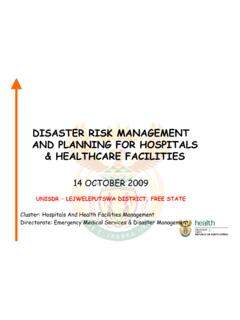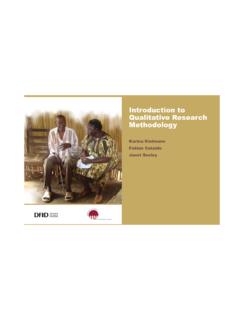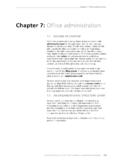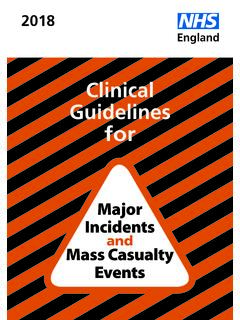Transcription of A Guide to the MEAL DPro
1 A Guide to the MEAL DPro ii Licensing information: MEAL DPro and the MEAL DPro logo are trademarks of Humentum. This work is licensed under the Creative Commons Attribution-NonCommercial International License. Under the following terms: Attribution You must give appropriate credit, provide a link to the license, and indicate if changes were made. You may do so in any reasonable manner, but not in any way that suggests the licensor endorses you or your use. NonCommercial You may not use the material for commercial purposes. To view a copy of this license, visit Version information Version , April 2019 A Guide to the MEAL DPro iii Acknowledgements To those who contributed to the creation, review and editing of this Guide . To the MEAL DPro Working Group who informed the scope, content and management of this initiative: Lupe Staigers, Paul Saitoti, Velida Dzino-Silajdzic, Marianna Hensley, Jenny Haddle, Alexandra Causton and Heather Dolphin.
2 The tools and diagrams featured in MEAL DPro are a selection of those already used widely in the development, humanitarian and environmental sectors. The Delta River IDP Project case study used throughout the Guide was created using an amalgam of cases and examples developed by Humentum, PM4 NGOs, Catholic Relief Services, Mercy Corps, WHO and UNICEF. This initiative would not have been possible without the support of Catholic Relief Services. We are also indebted to the Humanitarian Leadership Academy and Professionals in Humanitarian Assistance and Protection (PHAP) for their encouragement and support. Authors This Guide was written by Mike Culligan and Leslie Sherriff, with contributions by Clara Hagens, Guy Sharrock and Roger Steele. A Guide to the MEAL DPro iv Acronyms and Abbreviations CAQDAS computer-assisted qualitative data analysis software CoP community of practice CRS Catholic Relief Services FRM feedback-and-response mechanism GDPR General Data Protection Regulation ICT information and communications technology ICT4D information and communications technology for development IDP internally displaced person IR intermediate result IT information technology LAD learning-to-action discussion Logframe Logical Framework MEAL monitoring, evaluation.
3 Accountability and learning MOOC massive open online course ngo nongovernmental organization OECD organization for Economic Cooperation and Development PHAP Professionals in Humanitarian Assistance and Protection PIRS Performance Indicator Reference Sheet PMP performance management plan PSEAH preventing sexual exploitation, abuse and harassment RF results framework SET summary evaluation table SMART specific, measurable, achievable, relevant, time-bound SO strategic objective ToC theory of change ToR terms of reference UNICEF United Nations International Children s Emergency Fund USAID United States Agency for International Development WASH water, sanitation and hygiene WHO World Health organization A Guide to the MEAL DPro v Table of Contents Introduction .. ix MEAL: A key contributor to project success.
4 Ix Chapter 1: MEAL in Projects .. 1 What is MEAL? .. 1 Monitoring and Evaluation .. 2 Accountability and Learning .. 3 The MEAL phase model .. 4 Ethical standards in MEAL .. 6 Cross-cutting themes in MEAL .. 7 Participation .. 7 Critical thinking .. 7 Adapting the MEAL DPro .. 8 Chapter 2: Designing Logic Models .. 10 Introduction .. 10 What is a logic model? .. 10 Theory of change .. 12 Components of a theory of change .. 13 The long-term 15 Critical thinking: Treat the theory of change as a living document .. 19 Results framework .. 19 Logical Framework (Logframe) .. 24 Objectives statements (Column 1) .. 25 Assumptions (Column 4).. 26 Indicators (Column 2) .. 27 Standard or custom indicators? .. 30 Direct or indirect (proxy) indicators? .. 31 A Guide to the MEAL DPro vi Quantitative or qualitative indicators?
5 32 Measurement methods (Column 3) .. 34 Balancing the cost and complexity of measurement methods .. 37 Chapter 3: Planning MEAL Activities .. 41 Introduction .. 41 Section A: MEAL planning tools .. 41 Performance management plan .. 42 Objectives statements and indicators .. 44 Data collection: Methods, frequency, responsibility and respondents .. 45 Means of analysis .. 46 Data use .. 48 Indicator Performance Tracking Table .. 50 Feedback-and-response mechanism flowchart .. 52 Learning plan .. 56 Planning tools for MEAL communications .. 61 Evaluation planning .. 65 Summary evaluation table .. 66 Evaluation terms of reference .. 68 Section B: MEAL in project management .. 70 MEAL in the project calendar .. 70 MEAL in the project budget .. 71 Chapter 4. Collecting MEAL data.
6 74 Data 74 Developing data collection tools .. 75 Quantitative data collection tools: Questionnaires .. 77 Qualitative data collection tools: Semi-structured interviews and focus group discussions .. 79 Creating samples .. 81 Random sampling .. 81 Purposive sampling .. 85 Using data collection tools .. 87 Managing data .. 89 A Guide to the MEAL DPro vii Data entry .. 89 Cleaning data .. 90 Data storage and security .. 91 Data retention and de-identification .. 91 Chapter 5. Analyzing MEAL Data .. 93 Introduction to data analysis .. 94 Quantitative data analysis basics .. 94 Understanding quantitative data .. 94 Analyzing quantitative data using descriptive statistics .. 96 Measures of frequency .. 96 Measures of central tendency .. 99 The mean .. 100 Inferential analysis.
7 105 Contribution: An alternative to causation .. 107 Quantitative analysis errors .. 108 Qualitative data analysis basics .. 109 Data visualization .. 112 Interpreting quantitative and qualitative data .. 115 Data limitations to consider during interpretation .. 116 Chapter 6: Using MEAL Data .. 119 Introduction .. 119 Adaptive management .. 119 Progress reporting .. 121 Using data from the Delta River IDP Project .. 121 Glossary .. 124 A Guide to the MEAL DPro viii Notes: A Guide to the MEAL DPro ix Introduction MEAL: A key contributor to project success Development, conservation and humanitarian relief organizations manage their work through projects. Their offices are staffed by project teams that write project proposals, develop plans, implement activities, and track progress and impact.
8 To thrive and succeed, these organizations need to develop the knowledge and skills to manage their projects well. Every organization s project management process is unique, reflecting its culture, systems, policies and programmatic activities. Nevertheless, all project management models have at least one thing in common: Strong monitoring, evaluation, accountability and learning (MEAL) is critical to project success. The Guide to the MEAL DPro helps teams design, plan and implement MEAL in their projects. It provides clear, practical guidance and tools that can immediately be applied to their work. The Guide is written for project team members working in the development, humanitarian and conservation sector who are not specialists in MEAL. It is intended to benefit project officers, project administrators, project coordinators and other team members.
9 It will also help MEAL officers who may bew to the sector or their responsibilities. As a project team member, you might ask: Am I responsible for MEAL? Isn t that why we have MEAL specialists? While project teams often have MEAL technical specialists that support their projects, good MEAL is the responsibility of everyone involved in the design, planning and implementation of a project. You will need to understand the fundamental skills and tools that enable you to contribute to designing and planning MEAL systems, as well as collecting, analyzing and using your MEAL data. You won t have to do all this alone. As a project manager or project team member, you will collaborate with MEAL technical specialists to ensure that your systems are strong and that your MEAL data are timely and accurate.
10 Remember, however, that while the role of MEAL specialists is important, your role is indispensable, because you have the practical knowledge to apply MEAL at the project level. This understanding will help you identify strong or weak systems and data, and where there are opportunities for improvement. This practical, pragmatic knowledge is critical to project success. The good news is that if you are reading this introduction, you have already taken the first step toward improving your MEAL skills. A Guide to the MEAL DPro x A Guide to the MEAL DPro 1 Chapter 1: MEAL in Projects By the end of this chapter, you will be able to: Define the components, structure and purpose of MEAL Explain the benefits of a strong MEAL system Describe the relationship between MEAL and project management Identify the five phases of MEAL Describe the ethical standards and principles relevant to MEAL Understand the importance of participation and critical thinking in MEAL processes What is MEAL?




